Emergency Dentist — Wayland, MA
Stop Your Dental Pain with Emergency Care

Dental emergencies are typically sudden and inconvenient by nature. If you or a loved one is struggling with severe dental pain or injury, try to remain calm and don’t hesitate in reaching out to Dr. Michael Putt and the rest of the team here at Wayland Dental. We do everything in our power to see emergency cases as soon as possible, often on the same day as your initial call . We can also provide guidance over the phone for how to stabilize your condition in the interim, as well as whether or not an emergency room visit is warranted.
Why Choose Wayland Dental for Emergency Dental Care?
- Same-Day Emergency Appointments Available
- Availability in the Evening for Urgent Care
- Walk-Ins Welcome for Dental Emergencies
What to Do in a Dental Emergency

- Schedule a same-day visit with us: After you get in touch with our practice, we’ll be able to take note of your symptoms, provide first-aid tips over the phone, and get you scheduled for an emergency appointment the same day in most cases.
- Complete an emergency exam with Dr. Putt: When you arrive, our front desk we’ll make sure to keep your wait to a minimum. You’ll be brought to one of our operatories so he can complete an emergency exam and capture digital X-rays.
- Review findings and provide urgent relief: After getting you out of any immediate discomfort or pain, Dr. Putt will go over his findings with you one-on-one so you know exactly what is causing your symptoms. Before you leave or complete any treatment, you’ll have a clear estimate of your emergency dental care.
- Get care and resolve your emergency: Whether you need a dental filling, crown, root canal therapy, or other service to address your dental emergency at the source, we’ll work quickly to get you taken care of.
The Most Common Dental Emergencies
So what exactly constitutes a dental emergency? If you’re not quite sure, here are some of the most common situations where our team would recommend immediate care. The moment you experience a dental emergency, you should give us a call. Until you arrive at our office, you can learn how to improve your situation and comfort levels beforehand.
Understanding the Cost of Emergency Dentistry
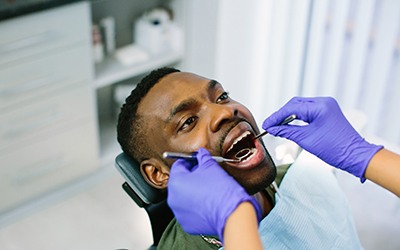
We can only start discussing the costs involved with your emergency care once we have taken a look at your smile and figured out what treatments are called for. Putting a stop to your pain and making your smile healthy again will always be our main goals, so rest assured that we will not recommend any unnecessary services. When we’re explaining how much you will likely need to pay for treatment, we encourage you to ask about the options we offer for making the cost of emergency dentistry more manageable.
Every Dental Emergency is Different
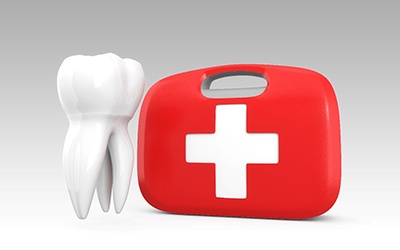
Every emergency situation is unique, and there are many different treatments you might need. For example, we may recommend:
- Fillings for small cavities.
- Crowns for cracked teeth.
- Root canal therapy for tooth infections.
- Tooth extractions for unsalvageable teeth.
Each treatment listed above has a different price tag attached, and other procedures might be suggested based on the circumstances. Hence, an examination is always required before an estimate can be made.
Does Dental Insurance Cover Dental Emergencies?
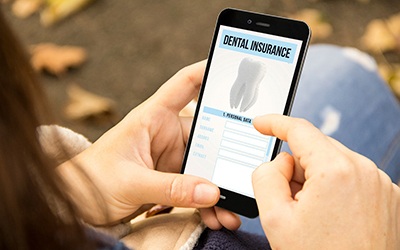
You’ll naturally want to take advantage of your dental insurance plan to help you pay for your emergency treatment. Many plans include coverage for various forms of restorative dentistry, including those that are often needed to resolve emergency situations. Talk to our team to confirm whether we accept your plan. We are in-network with Delta Dental, Cigna, and BlueCross BlueShield, but if need be, we can also take out-of-network PPOs.
Other Options for Making Dental Emergencies Affordable
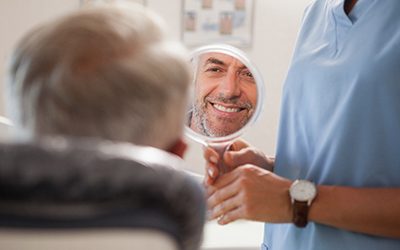
When you don’t have dental insurance, you might be worried about paying for emergency care. Luckily, here at Wayland Dental, we can make things a bit easier with Putt’s Preferred Patient Program. Members of this program receive a 15% discount on all of our services without restriction, meaning you can get whatever treatments you need at a lower price. There aren’t any limitations, and there isn’t an annual maximum that puts a cap on how much you can save during a single year.
Are you interested in signing up for our PPP Program? Reach out to our practice today to let us know! We can give you more details about how the program works and how you can sign up.
Taking Care of Your Smile Can Save You Money

When you don’t have a dental emergency to take care of, you don’t need to pay for emergency dentistry – it’s as simple as that. Brushing your teeth, attending regular dental checkups, and avoiding bad oral habits like nail-biting can all help you maintain a healthy smile and potentially save money on your dental care.
Of course, there’s no way to guarantee that you’ll never experience any kind of oral health issue. When problems arise in your mouth, we suggest that you call our office for an appointment as soon as possible. Even if it doesn’t currently seem serious, having the problem treated now might help you avoid more expensive care in the future.
How to Prevent Dental Emergencies

While not all dental emergencies are avoidable, patients can at the very least reduce their risk of experiencing a dental emergency by exercising caution when performing certain tasks day-to-day. While some of these tips may seem like common sense, there may be other suggestions you didn’t consider before. At Wayland Dental, prevention is key, and the steps below are some of the most effective at helping you and your family avoid emergency dental appointments and higher oral healthcare costs.
Visit Our Office Biannually for a Checkup
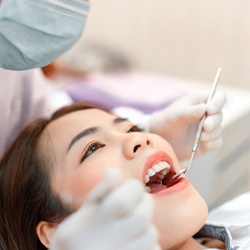
By attending routine check-ups and cleanings every six months, you can ensure there are no underlying issues with your smile and catch problems early if there are. Keep in mind that tooth decay and gum disease often develop in silence (i.e. symptoms aren’t very noticeable, if at all) especially in the earliest stages. With a routine checkup, our office can catch them, get you started on a treatment plan, and avoid the risk of a serious infection developing later that requires emergency dentistry to fix.
Maintain Good At-Home Brushing and Flossing
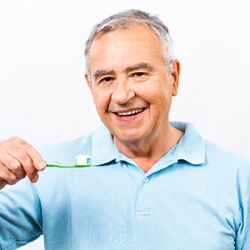
Routine preventive care is the backbone to any healthy smile. While we would certainly love to see you daily for a cleaning, that’s clearly not feasible, which means you’ll need to brush and floss at home to prevent plaque buildup. When left unremoved, plaque can cause cavities and gum disease to develop, resulting in major discomfort and dental emergencies. Thankfully, removing plaque is as simple as brushing twice a day and flossing daily.
Stick to a Mouth-Friendly, Balanced Diet

We advise against eating tough or sticky foods which can both be harmful to teeth and even cause a tooth to crack or chip. This is especially the case with ice cubes, so avoid chewing on them to prevent damage to your teeth. Additionally, eating a diet high in fruits and vegetables and reducing your consumption of foods high in sugar and starch will make a huge difference not just in your long-term oral health, but in reducing your risk of experiencing a dental emergency.
Wear a Mouthguard to Protect Your Smile
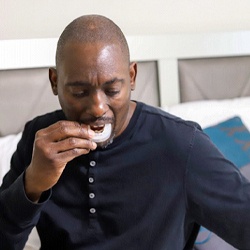
Wearing mouthguards when deemed necessary (such as once you’ve been diagnosed with bruxism/TMJ disorder or while playing sports) are incredibly important for protecting your smile. Most dental emergencies that occur are due to physical injuries while playing sports, so opt for not just a mouthguard, but a professionally-made one from our office. The same applies if you grind or clench your teeth at night; we offer custom nightguards to reduce the risk of you cracking or chipping a tooth in your sleep.
Never Use Your Teeth as a Tool
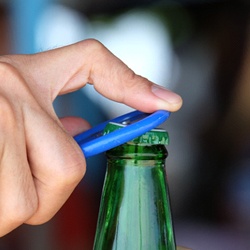
Teeth are not indestructible, which means they can easily become damaged if used in ways that are inappropriate. Using scissors instead of teeth to open tricky packaging is crucial. Alternatively, when you need to open a bottled beverage, use a bottle opener. While it may seem like you’re saving time by using your teeth, the consequences that can follow are not worth it.
Dental Emergency FAQs
Will My Toothache Go Away on Its Own?
In short, the answer is “no.” While many patients want to take the “wait and see” approach, tooth decay, infections, and other dental concerns like these cannot heal without treatment from a skilled dental professional. In other words, the longer you wait, the more likely it is that the root of the problem will progress. So, the moment you experience any unusual symptoms, from pain when you bite down to swelling in your gums, get in touch with our Wayland emergency dentist.
What Does Throbbing Tooth Pain Mean?
Throbbing tooth pain is often a sign of an infection. However, it can also occur if decay is present or the tooth has been fractured, cracked, or damaged in some way. Again, the best course of action is to schedule an appointment with our emergency dentist in Wayland. From there, our skilled team can pinpoint the root of the problem and create a custom treatment plan to address it!
Do Chipped Teeth Heal?
The hardest substance in the human body, enamel is quite incredible. Sadly, it’s not indestructible and it doesn’t have the ability to regenerate. So, when you chip a tooth, the missing structure won’t grow back. In fact, it’s probably vulnerable to further damage, which is why you shouldn’t wait to schedule an appointment.
What Should I Keep in My Emergency Dentistry Kit?
Dental emergency kits can help make handling a stressful or painful dental emergency significantly easier. If you don’t have one, then put together a bag next to your First Aid Kit filled with the following supplies:
- A small storage container for teeth or restorations
- Sterile gloves
- Gauze pads
- Cotton balls
- Dental cement (or other temporary filling material)
- Denture adhesive
- Petroleum jelly
- Anti-inflammatory medication, such as ibuprofen
- Topical anesthetic, like Orajel
- Floss
- Ice pack
- Contact information for your emergency dentist
How Should I Sleep with Tooth Pain?
If you’re struggling to sleep due to persistent tooth pain, there are a few things you can do. First, don’t eat any hard, crunchy, or spicy foods. This will exacerbate the soreness, making it difficult to get comfortable. Next, place a cold compress against the outside of your cheek or take an over-the-counter pain reliever to help numb the area. Lastly, prop up a few pillows so your head will stay elevated throughout the night. Remember, these are just short-term solutions designed to help you get a good night’s sleep until you have a chance to visit your dentist.
More to Explore
Preventive Dentistry Restorative Dentistry Cosmetic Dentistry Our Technology Dental Implants Snoring Cessation Periodontal Treatment See Our Services
